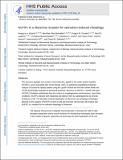NUFIP1 is a ribosome receptor for starvation-induced ribophagy
Author(s)
Wyant, Gregory A.; Abu-Remaileh, Monther; Frenkel, Evgeni M.; Laqtom, Nouf N.; Dharamdasani, Vimisha; Lewis, Caroline A.; Chan, Sze Ham; Sabatini, David M.; ... Show more Show less
DownloadAccepted version (1.201Mb)
Publisher Policy
Publisher Policy
Article is made available in accordance with the publisher's policy and may be subject to US copyright law. Please refer to the publisher's site for terms of use.
Terms of use
Metadata
Show full item recordAbstract
The lysosome degrades and recycles macromolecules, signals to the master growth regulator mTORC1 [mechanistic target of rapamycin (mTOR) complex 1], and is associated with human disease.We performed quantitative proteomic analyses of rapidly isolated lysosomes and found that nutrient levels and mTOR dynamically modulate the lysosomal proteome. Upon mTORC1 inhibition, NUFIP1 (nuclear fragile Xmental retardation-interacting protein 1) redistributes from the nucleus to autophagosomes and lysosomes. Upon these conditions, NUFIP1 interacts with ribosomes and delivers them to autophagosomes by directly binding to microtubule-associated proteins 1A/1B light chain 3B (LC3B).The starvation-induced degradation of ribosomes via autophagy (ribophagy) depends on the capacity of NUFIP1 to bind LC3B and promotes cell survival.We propose that NUFIP1 is a receptor for the selective autophagy of ribosomes.
Date issued
2018-04-26Department
Whitehead Institute for Biomedical Research; Massachusetts Institute of Technology. Department of Biology; Koch Institute for Integrative Cancer Research at MITJournal
Science
Publisher
American Association for the Advancement of Science (AAAS)
Citation
Wyant, Gregory A. et al. "NUFIP1 is a ribosome receptor for starvation-induced ribophagy." Science 360 (2018): 751-758 © 2018 The Author(s)
Version: Author's final manuscript
ISSN
0036-8075
1095-9203
Keywords
Multidisciplinary